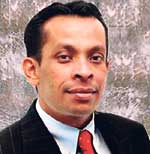
Big, bold steps for the IT industry
A highly professional, highly paid industry is how Madu Ratnayaka, General Manager of global IT-solution provider Virtusa, describes the growing IT sector in the country. Virtusa itself, founded by Kris Canekeratne, a Sri Lankan, in Boston USA, has been highly involved in the rapid growth of developing Sri Lanka as a destination for high-class IT and BPO solutions. Their most recent triumph has been winning the HRM Gold Award for its HR practices. “We are primarily people-based, they are the main asset of the company,” says Ishan Dantanarayana, Director of HR, Asia Head of HR, CCT business Unit. He explained that the main attraction Virtusa had for its basically young employee base is the challenge. “The work is intellectually challenging and they are forced to be creative,” he said. The firm allows them career growth as well as well as a clear structure that allows for respect as well as openness. “We have a firm open-door policy,” he said.
What most young people see as a main advantage for joining the IT industry is the fact that the boundaries attached to it are stretchable and almost non-existent. “Software management is not as mature as everyone thinks it is,” said Ratnayaka, going on to explain that the industry is still young enough to need a lot of backup. At Virtusa, the global team has a system of connectivity that enables anyone in the loop to post questions online on their domain regarding any problem they have, and someone from the 4,800 people employed all over the world would answer it within minutes. “The people here get global exposure as well as a fantastic experience in a short time span,” said Ratnayaka. Lack of capacity “The main problem we face today is the lack of capacity for IT graduates,” said Ratnayaka, confirming that Sri Lanka has a massive supply constraint problem that lies mainly in the fact that the local universities cannot cater to the current excess demand for IT graduates at all. The fact that foreign universities that are trying to set up here are being barred for political reasons does nothing to help the situation. Also according to him, there is a high drop-out ratio among those who do join the various ICT course, “because they have no support, no motivation.” The situation is prevalent mainly in areas outside Colombo. It is a reflection of the situation that Ratnayaka says that locally they have competition talent-wise, but not business-wise. To overcome the barrier of lack of capacity, one of Virtusa’s CSR projects is the “Campus Reach” programme that works with local universities and officials to increase the existing capacity. Since the company mainly recruits graduates the cause is close to their heart. They have so far collaborated with the administration divisions of most of universities in the island to develop and update the ICT curriculum, train lecturers and involve Virtusa officials in the teaching programmes. They also have close to 150 students from the universities interning at Virtusa. The response of the universities has been promising, “You don’t have to go behind them,” he says. The authorities appear to have woken up to the essentiality of IT in the modern world. Leapfrogging an era Sri Lanka has leapfrogged an era, says the General Manager. “We missed out on the Internet boom and the PC generation when it was in full force in Europe and the USA, but now have an amazing rate of technology adoption and mobile density. Yet the IT literacy rate in the island is a pitiful 10 percent only, according to a survey done by the ICTA,” he said. The IT infrastructure in the island is of course plagued by the civil war, a fact that Ratnayaka admits has been a major cause of client hesitancy to invest or engage with Virtusa Sri Lanka. He also sees the costs of telecommunication and electricity (with the newly added tariffs) as not low enough to fully facilitate the IT industry. The steps that have been taken so far are alright he says but not enough. Including ICT in the school curriculum he sees as a “radical change” while the government’s ‘Nenasala’ programme to set up IT-kiosks across the island he termed, “ great but won’t change the industry”. Big, bold steps in the industry When Virtusa decided to expand from the USA, the destination they chose was India. According to Ratnayaka and Dantanarayana, taking an example from India would be the best idea, he says. They made IT a national priority, which was a turning point in their country and the industry as a whole. A large investment was channelled into IT infrastructure and personnel training, paying off in the form of India fast becoming the most sought after destination for cheap IT and BPO services. “We need to take big, bold steps in this industry,” said Ratnayaka. If the state were to encourage and facilitate the foreign colleges and institutions which are willing and even eager to set up here, the massive shortfall of graduates could be dealt with. Also, getting more industry officials involved in the IT struggle would have a beneficial effect. Success lies in Sri Lanka realising a niche market and working toward developing high-end services.“The Sri Lankan IT/BPO industry has the potential to be the highest revenue gainer within the next 10 years,” says the positive Ratnayaka. |
|
||||||
|
||||||
| || Front
Page | News
| Editorial
| Columns
| Sports
| Plus
| Financial
Times | International
| Mirror
| TV
Times | Funday Times || |
| |
Reproduction of articles permitted when used without any alterations to contents and a link to the source page.
|
© Copyright
2008 | Wijeya
Newspapers Ltd.Colombo. Sri Lanka. All Rights Reserved. |

